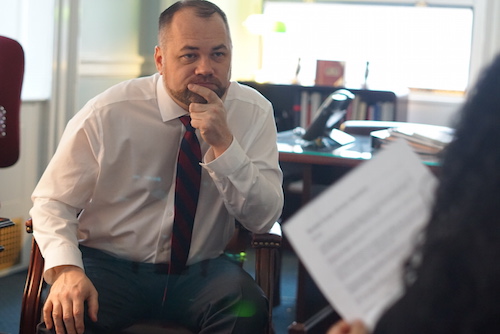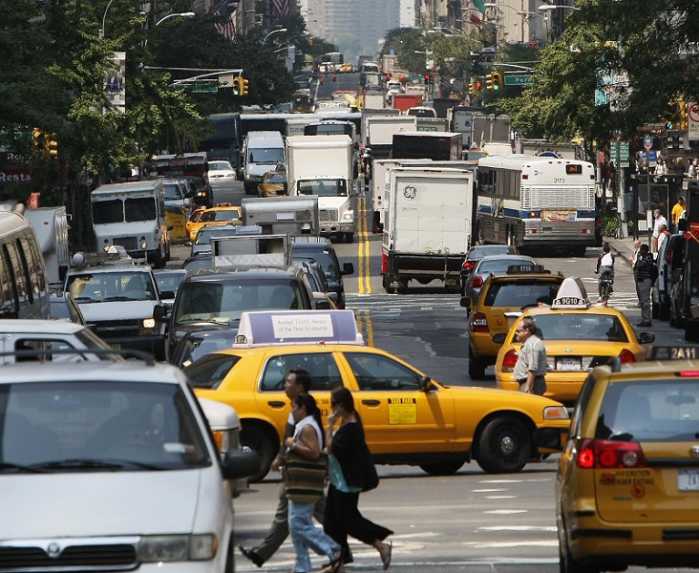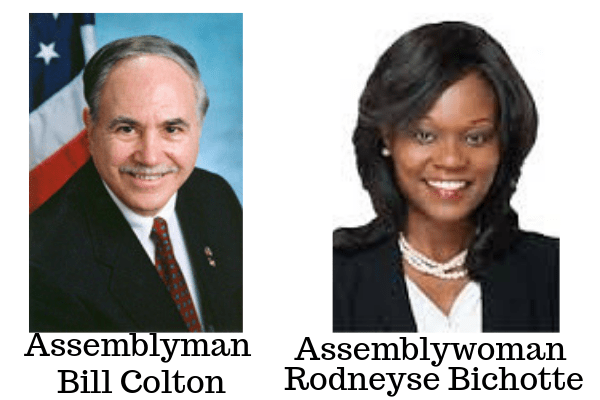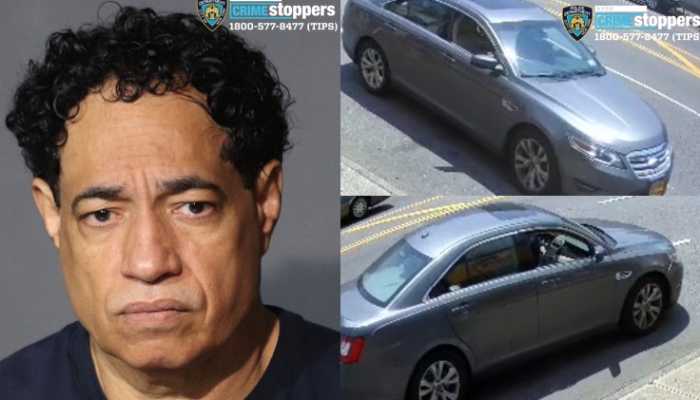Newly Elected City Council Speaker Corey Johnson (D-Hell’s Kitchen, Chelsea, the West Village, and parts of Flatiron, SoHo, parts of the Upper West), 35, is a Massachusetts native who came to New York City at the age of 19.
Upon arriving in the city, Johnson immediately became politically active, working on the campaigns of former Public Advocate and mayoral candidate Mark Green and former State Comptroller and gubernatorial Candidate Carl McCall.
Johnson also served on Community Board 4, eventually becoming its’ Chair. When term-limited former City Council Speaker Christine Quinn ran for mayor in 2013, Johnson successfully ran for her City Council Seat.
Johnson is the first openly gay speaker of the New York City Council, and has been open about his HIV status as well as his battles with addiction. In person, he is affable and sharp, exhibiting a strong grasp of both politics and issues confronting the city.
The following interview, edited for length and clarity, took place in the Speaker’s first floor office at City Hall in Lower Manhattan.
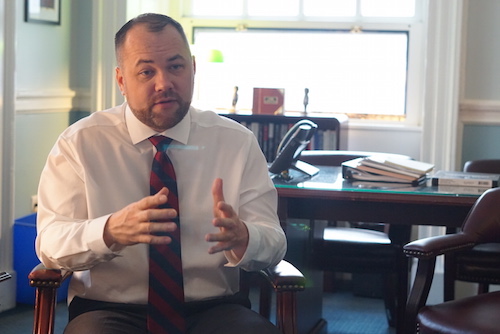
KCP: In the wake of NYCHA’s recent failures including a boiler system breakdown and allegations of mismanagement by Chair Olatoye, what kind of oversight, or check and balances is the City Council looking to implement in order to bring stability to the struggling authority?
But the endemic issues that have plagued NYCHA for far too long, whether they be the lead paint, the boilers, roofs, mold and major infrastructure disinvestment are something that we’re going to look at systematically. Now I believe that the issues we are talking about are bigger than one person. That does not mean that the Chair doesn’t ultimately have accountability at the end of the day, but NYCHA has a $25 billion capital maintenance need. And if you swapped the Chair out tomorrow, these problems,which are long-standing, would not be fixed.
So you’ll see a series of hearings, you’ll see the Council pushing for more capital money in the budget process for NYCHA, you’ll see the Council advocating in the State budget for more NYCHA money and Congressman [Hakeem] Jeffries at his State of the District Address, last week, talked about this infrastructure plan that’s going to be headed in Washington. He is going to attempt to get federal infrastructure dollars for NYCHA and public housing, in that this needs to be a team effort between City, State and the federal government to get NYCHA the money it needs. Twenty-five billion dollars can not be done by one set of government alone.
The de Blasio Administration is pushing ahead with Project NextGen, his initiative to sell off some of the NYCHA property including green space, playgrounds and parking for residents to developers for mixed market-rate and affordable housing, with the thinking the money made from this sell-off will go back to cash-strapped NYCHA. What is your stance on this model?
When it comes to Project NextGen itself, I am a supporter. Again the long-term capital needs for NYCHA require for us to think outside the box and do things differently. You can do that while at the same time not taking away key playgrounds, parks, public open spaces that public housing residents deserve and need. However, there are some underutilized parcels of land at NYCHA developments throughout the city and this plan puts forward a strategy for bringing more affordable housing online.
Would you ever consider putting in a liaison to represent the City Council that would sit on the NYCHA Executive Board to oversee the authority’s management going forward?
We sort of do that right now. So if a particular chair wants to have an oversight hearing on a particular project, that staff member here at the Council reaches out to NYCHA, works with local communities, works with local elected officials to get the requisite information to have that hearing so that the Council members are prepared beforehand and that we have updates throughout the process to know what’s going on.
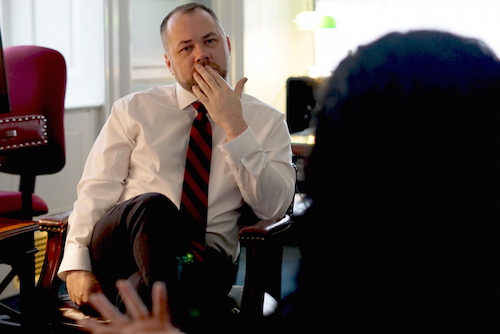 New York State Governor Andrew Cuomo recently put out a controversial congestion pricing proposal in which motorists will pay over $11 to drive under 60th Street in Manhattan. How do you see the City Council managing legislation in favor or in opposition to the proposal?
New York State Governor Andrew Cuomo recently put out a controversial congestion pricing proposal in which motorists will pay over $11 to drive under 60th Street in Manhattan. How do you see the City Council managing legislation in favor or in opposition to the proposal?
Well personally, I support congestion pricing but as I’ve said both before and after the charter meeting, when I was elected speaker and in the intervening weeks, I am going to lead this body by consensus not by an iron fist. That means being able to work with outer-borough members who have real concerns about the proposal. I’m not going to ram something through just because it’s my priority. I’m going to look to find consensus.
We’re not looking to be punitive. We are looking to disincentivize cars from coming into Manhattan to lessen congestion and also raise revenue for the MTA to improve transit in all five boroughs not just Manhattan.
While much has been written about the increased congestion in Midtown due to an increase in motor vehicles, under former Mayor Bloomberg and now Mayor Bill de Blasio, large sections of Midtown were closed off to vehicle traffic specifically around Times Square and Herald Square. Additionally, bike lanes have cut off motor vehicle lanes on major avenues. Do you believe that those closures were valid, when they still continue to be a highly trafficked corridors?
I don’t think that there is one particular thing that has significantly contributed to congestion in Manhattan. There are a series of things–bike lanes, pedestrian plazas, for-hire vehicles–all of these things together have created more congestion.
So personally I’m supportive of the plazas, they make those areas that are heavily pedestrianized and see a huge number of tourists much safer as part of the Vision Zero Plan.
But I think until you disincentivize cars from coming into Manhattan, you can rip plazas out, you can build plazas, you can put bike lanes in, you can not put them in. You can do all these things and you are still just tinkering around the edges. Until you can actually get people to stop driving into Manhattan, you’re going to have major congestion.
Do you think that the proposed plan is the best solution to the issue? What about the proposed Millionaires Tax Plan?
Personally I support a Millionaire Tax. I don’t see it going anywhere with a Republican led State Senate. I think that if the governor is able to craft a budget plan includes a congestion pricing proposal that is fair and equitable, then I probably think that is the best path forward.
But even the congestion pricing plan itself, which could raise somewhere between $200 and $300 million dollars in additional new revenue in the first year, doesn’t solve the subway issue. The subway issue is much bigger than congestion pricing. The long-term issue of the subway system is of us ensuring that the MTA gets the money that it deserves and needs, that it’s managed properly, that’s budgets stay on budget and that projects stay on time. I want to talk about a five-year Capital Plan, a 10-year Capital Plan, a 25-year Capital Plan because we need to plan long-term and make sure each part of the city is taken care of.
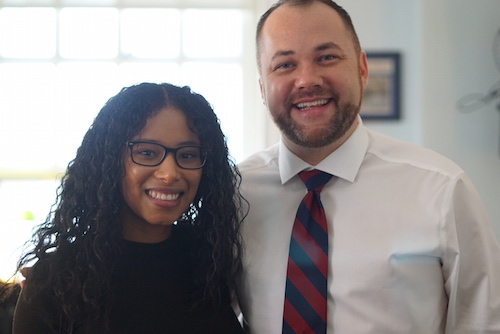
The mayor recently refused to meet with President Trump due to a crackdown from the Department of Justice on sanctuary cities. At the same time, the city is in desperate need of infrastructure support. How do you think New York City can both protect undocumented immigrants and deal with the White House on getting much-needed infrastructure funding?
It’s a very difficult balance. I understand why on the day the mayor was supposed to fly down to Washington,he was unhappy to learn that the Department of Justice was threatening New York City and the funding we receive because of our Sanctuary City status. So I understand that.
The President is so thin-skinned. Maybe you go there and you call him out in the meeting. You say to him, ‘You’re from New York. You have a lot of money invested in New York. You spent your entire career in New York. How are you going to punish and hurt New York like this?’
But that’s not me questioning the mayor’s strategy on this. He might have information that I don’t have when it comes to the big picture and federal funding.
But a few things: one we must remain a sanctuary city. We are the most diverse city in the world. One-hundred and eighty languages spoken in Queens, over 100 languages spoken in Brooklyn, and almost 40% of New Yorkers right now out of 8.2 million were not born in the United States. Four out of 10 New Yorkers were not born in the States. That’s incredible! We literally are the entryway to the American Dream for people from all around the world.
My hope is that in nine and a half months, 10 months that Chuck Schumer will become majority leader and the Democrats will take the House back, and when that happens we will be able to protect ourselves a lot more.
Would you ever consider yourself meeting with President Trump to discuss the needs of NYC?
I mean we both love Big Macs but I don’t think the President would meet with me. The President is a racist. The President I think has major cognitive issues. But I never say no.
There appears to be a growing divide in the Democratic party between progressive Democrats and mainstream centrist Democrats. As speaker where do you sit on that divide?
I think there’s always been a divide. This is nothing new. It always happens every four years, different parts of the party are prioritizing different issues, given that moment in time. And there’s always the issue of do you attempt to appeal to the base or do you attempt to be a little more moderate to get independent voters? I think you can do both. I think you can run as a populous progressive while you talk about issues that matter to hardcore Democratic progressive voters, while at the same time, speaking about it in a way that appeals to broader swaths.
I count myself as a progressive but I count myself as a pragmatic progressive. Someone who is results oriented, who is constructive and who wants to get things done for the city, and I’m still a member of the [council] Progressive Caucus.
Do you have any particular strategy when it comes to unifying the two factions when working on pushing legislation?
We’re going to do things here by consensus. So were going to have open conversations, open discussion. I think that the way that you achieve success in a legislative body is by having consensus and not tearing the body apart through controversial votes and issues. If there is a way to mold consensus as a leader, I’m going to try and do that, as Dr. Martin Luther King Jr. talked about. There’s going to be times when we disagree but I’m going to do my best to lead from a consensus point of view.
So would you characterize your leadership as one of diplomacy?
I don’t know. We’re less than a month in and I feel, everyone seems to be pretty happy. I know that won’t last forever, but I’ve really tried to be collaborative, respectful, helpful. I’ve been going out to members’ inaugurations all across the city. I’ve been going to members’ districts all across the city. I’ve been meeting with a diverse set of leaders all across the city, and I will continue to do that throughout my speakership.
But again it’s early. It’s the honeymoon, and things will go south at some point. But it’s about maintaining some level of balance, and also ensuring that people are treated with a level of respect even if they disagree with you, which I’m going to do. Even if someone screws me, I’m going to treat them with respect.


